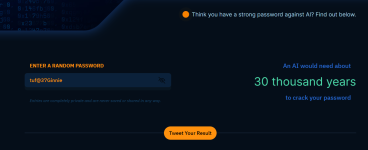- Aug 17, 2017
- 1,609
AI may be able to do lots of cool things like write computer code, tell you a story, and explain the theory of relativity. But it can also do at least one thing that's not so cool: Figure out your passwords. A new report released by security experts at Home Security Heroes shows how a savvy AI tool can be used to crack common passwords in minutes or seconds.To determine how long it would take to crack 15,600,000 common passwords via artificial intelligence, Home Security Heroes enlisted an AI tool known as PassGAN.

How an AI tool could crack your passwords in seconds
More than half of the common passwords examined by online security experts can be cracked in less than a minute with help from AI.
 www.zdnet.com
www.zdnet.com








